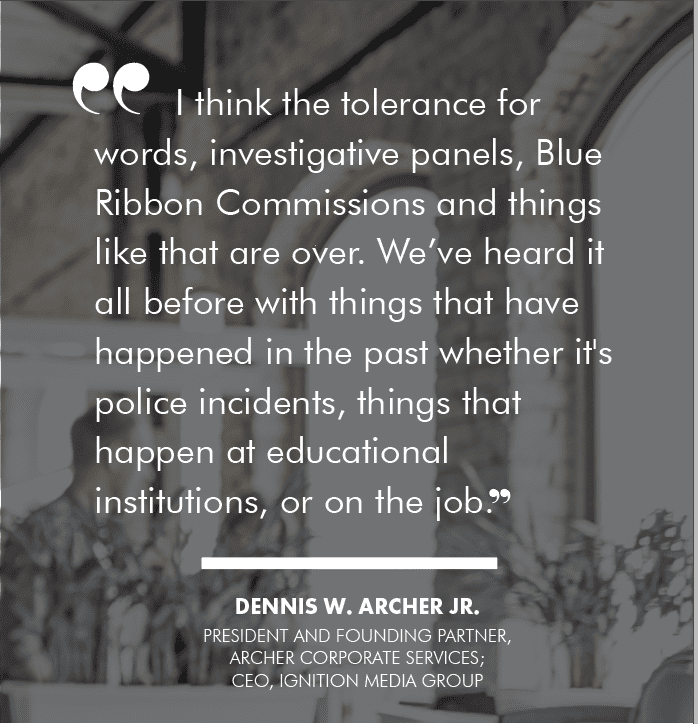Beyond Words: Achieving Equity Requires Deliberate Action and Investment
October 2, 2020
With a social justice sweeping the nation following the brutal murder of George Floyd, a Black man from Minnesota at the hands of the Minneapolis police in May, the corporate world has stepped forward with support and a declaration of a renewed commitment to social justice, diversity, and inclusion.
But Black corporate executives say it will require more than comforting words in a moment of crisis or even high profile philanthropic endeavors for meaningful change to occur. They argue it’s going to take a sustained and unambiguous commitment to achieve racial equity – not just diversity and inclusion – to make a lasting impact.
Suzanne Shank, CEO, Siebert Williams Shank & Co. the largest minority-owned and majority woman-owned investment bank in the U.S. said this begins with corporate policy changes aligned with an effort at making fundamental changes to structural racial barriers which inhibit the ability to achieve racial equity in a business.
For example, when the horrific tapes of the George Floyd and Ahmaud Arbery killings emerged, along with the reports of the Breonna Taylor killing, Shank had to be proactive in addressing the trauma it caused her employees.
“We began to notice that our employees were very troubled; we have many Black men in the firm and a very diverse firm, so we issued a statement that we understood if they needed time or needed someone to talk to, that we were there (for them),” she said. “But we also said if anyone wants to support any of these organizations whose fundamental mission is to fight racism, we will match your contribution, and we also wanted them to know we shared their frustrations.”
Her firm’s commitment, however, went far beyond words of empathy and in-kind contributions. Shank also shared Siebert Williams Shank & Co. recently announced the formation of Clear Vision Impact Fund, LLC, which is being started with a seed investment from the Microsoft Corporation of $25 million and the target is to grow it to $250 million.
“The goal of the fund is to really address the fundamental problems many minority-owned businesses have experienced; a lack of capital to operate, or investment to grow,” Shank said. “So we are going to be focusing on small and medium-sized businesses with an emphasis on Black-owned and minority-owned businesses in underserved communities.”

By providing such resources Shank said her firm’s intent is to increase employment opportunities in underserved communities since minority-owned businesses tend to hire more diverse workforces.
Carla Walker-Miller, CEO, Walker-Miller Energy Services acknowledged that as a Black woman, she occupies a unique space in an overwhelmingly white male industry and has the battle scars to prove it. So the spectacle of George Floyd’s murder was a lurid reminder that despite her success, the struggle for civil rights and basic human dignity continues to define the Black experience in America.
Walker-Miller admitted like many others, she too, struggled to cope with the trauma from Floyd’s death and it had sparked a journey of deeply personal and corporate self-reflection. So, she wrote a heartfelt letter to her internal team about the incident and what they needed to do at this moment. She later revised the letter and made it public as an open letter to CEOs in June.
In it, she noted among the initiatives her company has undertaken even before the Floyd killing include: instituting a $15-an-hour minimum wage; adopting fair-chance hiring practices for citizens returning from incarceration; setting a goal of hiring Detroiters for 60 percent of the jobs in its Detroit headquarters; and decentralizing her company’s procurement process to spend money with diverse businesses in the communities we serve.
Walker-Miller postulated that in a national crisis such as this, good corporate citizenship and basic human decency requires those in leadership positions to leverage their influence to create a fairer, thoughtful and supportive work environment for employees and all citizens. And other CEOs have a responsibility to move beyond the rhetoric and to action in helping to achieve equity in a business.
“So, we must now move it from where it’s a conversation to where it is action and more than a formation of committees to study the issue,” she said.

Dennis W. Archer Jr., president and founding partner of Archer Corporate Services (ACS) and CEO of Ignition Media Group (IGNITION) put it more bluntly. He said nice words and expressions of intentions to do better in the future aren’t going to cut it anymore.
“Black folks are over that. ALL Black folks are over that,” he said. “I think the tolerance for words, investigative panels, Blue Ribbon Commissions and things like that are over. We’ve heard it all before with things that have happened in the past whether it’s police incidents, things that happen at educational institutions, or on the job.”
However, Archer said initiatives like those revealed during a June press conference called by Detroit Mayor Mike Duggan and Detroit NAACP President the Rev. Wendell Anthony where CEOs of nine Detroit businesses spoke out against racism and committed themselves and their companies to invest in programs and policies to help transform disparities that exist, locally and nationally, is exactly what is needed in this moment of racial reckoning.
Trevor W. Coleman is a former Detroit Free Press editorial writer and columnist and director of communications for the Michigan Department of Civil Rights.
